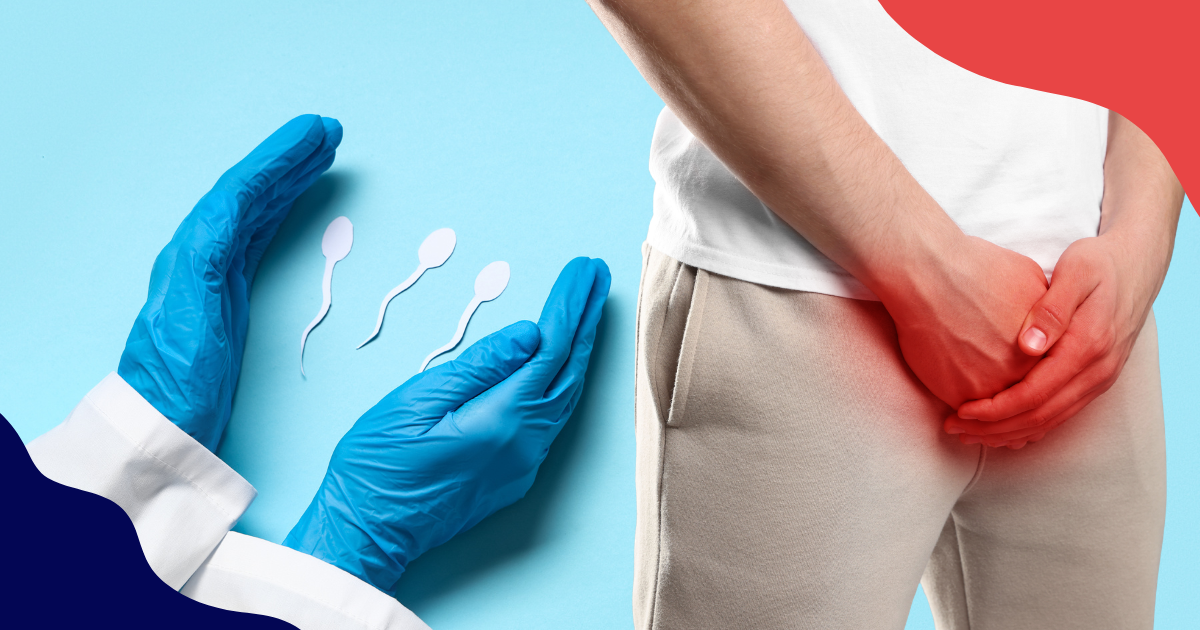Premature ejaculation can feel like a frustrating and lonely experience. But if you’re also trying to conceive, you might be asking, “is premature ejaculation a sign of infertility?” The short answer is no, but the two can be linked by deeper health issues. In this article, we’ll talk about how they overlap and what you can do to address both.
Does Premature Ejaculation Cause Infertility?
A lot of men ask, “does premature ejaculation mean infertility?” Premature ejaculation (PE) and male infertility are two different conditions. PE is when a man ejaculates sooner than he or his partner would like, usually within a minute of penetration. Male infertility, on the other hand, is the inability to get a partner pregnant after a year of regular unprotected sex. PE does not directly affect sperm quality or fertility levels.
However, both PE and male infertility may share common contributing factors. Hormonal imbalances, elevated levels of stress, anxiety, chronic health conditions, and lifestyle issues can affect both. In some cases, PE may indirectly make it harder to achieve pregnancy. For example, if ejaculation happens before penetration or too soon after, sperm may not be deposited deep enough in the vagina or near the cervix. This can lower the chances of fertilisation.
Common Causes of Male Infertility
Male infertility can stem from a wide range of physical, genetic, hormonal, and environmental factors. Below are some of the most common culprits that can sabotage your chances of conceiving:
Sperm Abnormalities
Sperm health is one of the most critical factors in male fertility. Common abnormalities include a low sperm count (oligospermia), no sperm in the semen (azoospermia), sluggish movement (low motility), or structural defects such as misshapen heads or tails. These issues make it harder for sperm to reach and fertilise an egg. Even when present in normal quantities, abnormal sperm often fails to complete the journey to conception.
Genetic Conditions
Certain inherited disorders can impair male reproductive development or function. For instance, Klinefelter syndrome occurs when a man is born with an extra X chromosome (XXY instead of XY), often resulting in small testicles and low testosterone. Myotonic dystrophy, a type of muscular dystrophy, can lead to testicular atrophy and low sperm production. These genetic issues disrupt the normal hormonal signals and biological processes that create healthy sperm.
Inflammation
Inflammatory conditions in the male reproductive tract can directly impair sperm health. Epididymitis is the inflammation of the epididymis, the tube that stores and carries sperm. Meanwhile, orchitis is the inflammation of the testicles themselves. These conditions may be caused by infections or autoimmune reactions and can result in scarring, obstruction, or damage to sperm-producing tissues. If left untreated, inflammation can lead to long-term fertility problems or even permanent damage.
STDs
Sexually transmitted diseases like chlamydia, gonorrhoea, syphilis, herpes, and HIV can interfere with male fertility in multiple ways. These infections may damage the reproductive organs, cause inflammation (such as epididymitis), or block the passage of sperm. Some STDs are asymptomatic, allowing them to silently cause harm over time. Chronic or untreated infections can result in scarring or permanent reproductive damage.
Varicoceles
A varicocele is a swelling of the veins inside the scrotum, often described as a “bag of worms.” This condition is one of the most common reversible causes of male infertility. Varicoceles can impair sperm production by raising the temperature in the testicles and disrupting blood flow. As a result, both the quality and quantity of sperm may decrease.
Testicular Injury
Physical trauma or medical interventions involving the testicles can reduce fertility. Testicular trauma, orchiectomy (surgical removal of one or both testicles), and cancer treatments like chemotherapy or radiation may damage the cells responsible for sperm production. These events may lead to partial or complete infertility depending on the severity and location of the damage. Even if one testicle is unaffected, overall sperm output can still suffer.
Hormonal Imbalance
Reproductive hormones play a critical role in regulating sperm production. Conditions like hypogonadism (low testosterone), hypothyroidism (the thyroid produces less hormones), hypopituitarism (the pituitary gland secretes less hormones), and prolactinoma (a tumour affecting prolactin levels) can disrupt the hormonal signals that trigger sperm creation. When these hormones are out of balance, the testes may not function properly, leading to poor sperm quality or no sperm at all.
Environmental Damage
The environment around you can significantly influence your sperm health. Prolonged exposure to heavy metals like lead or mercury, high temperatures (such as from frequent sauna use or tight clothing), and pesticides may impair sperm production. These factors may disrupt hormone levels, damage sperm DNA, or interfere with sperm motility. The effects are often cumulative and may take time to reverse.
Toxic Substances
Substances like alcohol, tobacco, and recreational drugs are known to lower fertility in men. Alcohol can suppress testosterone levels and impair liver function, while smoking reduces sperm count and damages sperm DNA. Drugs like anabolic steroids, marijuana, or cocaine can shrink the testicles and disrupt hormone production. These toxic substances create oxidative stress in the body, which harms sperm at the cellular level.

How Premature Ejaculation Affects Pregnancy
We’ve answered the question “can premature ejaculation cause infertility.” However, what we’ve yet to expound on is how premature ejaculation may indirectly affect couples’ attempts to get pregnant in multiple ways.
In some cases, premature ejaculation happens before full penetration. This means the semen may not reach deep enough into the vaginal canal to allow for proper sperm travel. Even if there’s some contact, ejaculation outside the body or near the opening reduces the chance of conception. When this keeps happening, it can be disheartening and stressful for both partners. Over time, this frustration can turn into avoidance of sex altogether.
Premature ejaculation can also create tension in the relationship. One partner may feel pressured while the other may feel ashamed or embarrassed. These emotional struggles can lead to poor communication, resentment, or even performance anxiety. If intimacy becomes stressful or is avoided, the window of opportunity during the fertile period may be missed. This doesn’t mean the man is infertile, but the chances of pregnancy naturally go down.
Improving Fertility and Premature Ejaculation
While they are separate issues, premature ejaculation and male infertility often stem from overlapping factors. Here’s how you can manage both premature ejaculation and male infertility:
- Medical Consultation – a general check-up is the first step to diagnosing either premature ejaculation or male infertility. For premature ejaculation, your doctor may ask about sexual habits, history of the condition, or other possible psychological or physiological triggers. For infertility, your provider may order blood tests, hormone panels, imaging, or genetic screening depending on your health history and exam results.
- Semen Analysis – semen analysis is a key diagnostic tool for male infertility. It evaluates sperm count, motility (movement), shape, and overall semen volume to detect underlying issues. This simple but crucial test helps doctors identify if fertility concerns are due to low-quality or insufficient sperm.
- Therapy – therapy is especially effective for premature ejaculation, which often has psychological roots. Talking to a psychologist or sex therapist can address performance anxiety, low self-esteem, or stress. For infertility, therapy offers emotional support during a painful process. Couples counselling can also help partners stay connected and united through sexual health challenges.
- Lifestyle Adjustments – a healthy lifestyle can improve both fertility and ejaculation control. Exercise regularly, eat more fruits and vegetables, and avoid smoking and drinking alcohol. Manage stress, sleep well, and stay within a healthy weight range. These habits support hormone balance, blood flow, and sexual health.
- Professional Treatment – premature ejaculation may be treated with topical anaesthetics or SSRIs that help delay ejaculation. At Men’s Health Clinic, we offer comprehensive care with custom medications, meal plans, and counseling tailored to your needs. For male infertility, assisted reproductive technologies like in vitro fertilisation (IVF) is one of the advanced options taken when natural conception is difficult. In IVF, fertility clinics harvest healthy egg cells from a woman and place them with healthy sperm in a laboratory.
Conclusion
Can premature ejaculation cause infertility? On its own, it usually doesn’t. But if it leads to issues with sperm delivery or points to an underlying condition, it can affect your chances of conceiving. The good news is that premature ejaculation and infertility are treatable. And if you’re worried about premature ejaculation, we’re here to help you get clear answers and proper care. Book a consultation today and take the next step toward better sexual health!




